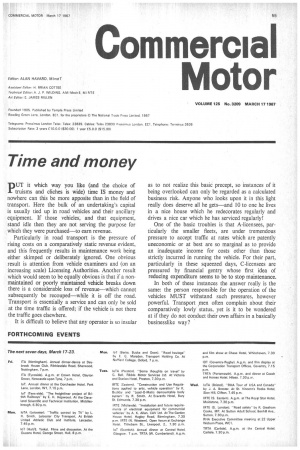Time and money
Page 57

If you've noticed an error in this article please click here to report it so we can fix it.
DUT it which way you like (and the choice of truisms and cliches is wide) time IS money and nowhere can this be more apposite than in the field of transport. Here the bulk of an undertaking's capital is usually tied up in road vehicles and their ancillary equipment. If those vehicles, and that equipment, stand idle then they are not serving the purpose for which they were purchased—to earn revenue.
Particularly in road transport is the pressure of rising costs on a comparatively static revenue evident, and this frequently results in maintenance work being either skimped or deliberately ignored. One obvious result is attention from vehicle examiners and (on an increasing scale) Licensing Authorities. Another result which would seem to be equally obvious is that if a nonmaintained or poorly maintained vehicle breaks down there is a considerable loss of revenue--which cannot subsequently be recouped—while it is off the road. Transport is essentially a service and can only be sold at the time traffic is offered; if the vehicle is not there the traffic goes elsewhere.
It is difficult to believe that any operator is so insular as to not realize this basic precept, so instances of it being overlooked can only be regarded as a calculated business risk. Anyone who looks upon it in this light really does deserve all he gets—and 10 to one he lives in a nice house which he redecorates regularly and drives a nice car which he has serviced regularly!
One of the basic troubles is that A-licensees, particularly the smaller fleets, are under tremendous pressure to accept traffic at rates which are patently uneconomic or at best are so marginal as to provide an inadequate income for costs other than those strictly incurred in running the vehicle. For their part, particularly in these squeezed days, C-licensees are pressured by financial gentry whose first idea of reducing expenditure seems to be to stop maintenance.
In both of these instances the answer really is the same: the person responsible for the operation of the vehicles MUST withstand such pressures, however powerful. Transport men often complain about their comparatively lowly status, yet is it to be wondered at if they do not conduct their own affairs in a basically businesslike way?








































































































































































































